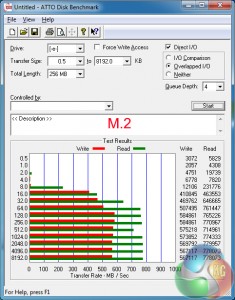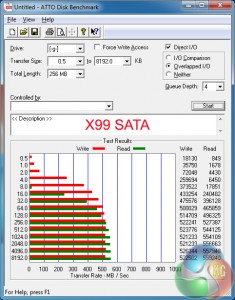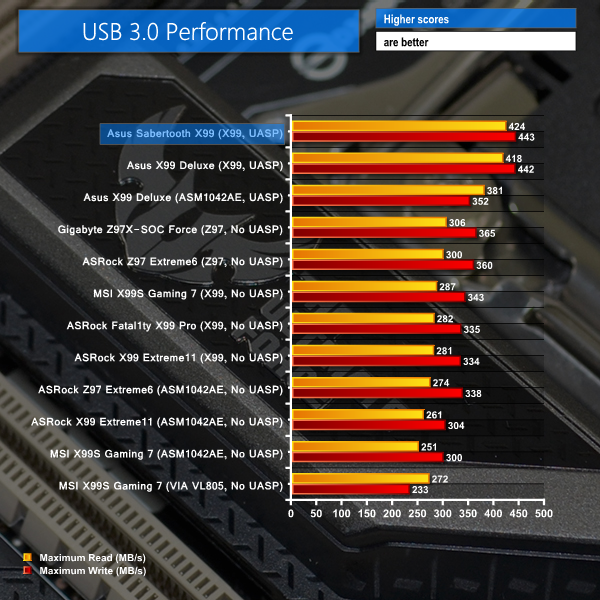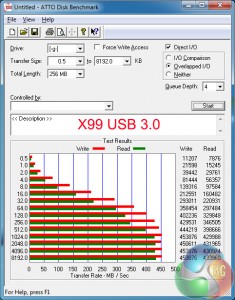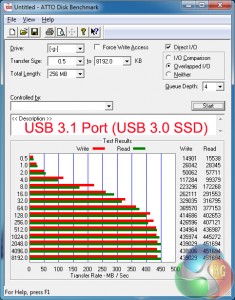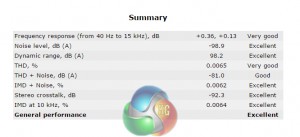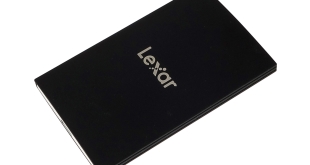M.2 connector
We use Plextor‘s fast M6e 256GB M.2 SSD to test the speed of a motherboard's M.2 connector. We reviewed the 512GB Plextor M6e (and its PCIe x2 adapter card) HERE. Unfortunately we do not have access to a PCIe 3.0-based SSD to fully test the M.2 connector's performance limits.
Asus feeds the board's M.2 connector with up to four PCIe 3.0 lanes directly from the CPU. That translates into a 32Gbps bandwidth potential, which is more than enough speed to satisfy any M.2 SSD currently on the market.
There's also NVMe support with the Sabertooth X99, both over its M.2 socket and the separately-available SFF-8639-supporting Hyper Kit card. Intel should be releasing a (potentially consumer-orientated?) NVMe-based drive in Q2 of this year, bringing with it potential transfer rates of more than a couple of Gigabytes per second (based on rumours).
SATA
For SATA 6Gb/s testing we use a Kingston HyperX 3K (SandForce SF-2281) SSD.
SATA 6Gbps performance from the X99 chipset is without issue, as we would expect.
USB 3.0
We tested USB 3.0 performance using the Kingston HyperX 3K SSD connected to a SATA 6Gb/s to USB 3.0 adapter powered by an ASMedia ASM1053 controller.
Asus' excellent USB 3.1 Boost software allows us to unlock enhanced UASP-derived transfer rates. Since ASRock dropped its XFast USB software, Asus is currently the only board vendors to provide a UASP-activating tool for its Windows 7 users.
Windows 8.1 users will see little performance difference between any of the X99-fed USB 3.0 ports on competing motherboards, thanks to the Operating System's built-in UASP driver.
I tested the ASMedia ASM1142-fed USB 3.1 ports with our USB 3.0 adapter and SSD simply as a way of validating their performance with current external drives. They have no problems pushing a USB 3.0-linked SSD to its speed limit, so we would not expect any major issues with USB 3.1 drives.
We took an in-depth look at Asus' USB 3.1 solution, where we tested it with RAID 0 Samsung 840 EVO SSDs, here. The ports should be good for sequential transfer rates towards the 800MBps-mark.
Audio
We use RightMark Audio Analyzer (RMAA) to analyse the performance of the motherboard’s onboard audio solution. A sampling mode of 24-bit, 192 kHz was tested.
The Sabertooth X99 motherboard's audio systems comprises Realtek's ALC1150 codec and a Texas Instruments RC4580 operational amplifier (marked R4580i). Segregated audio circuits are used to avoid channel interference, however Asus refrains from using specific EMI shielding over the codec.
According to RMAA, Asus' Sabertooth X99 delivers Excellent general audio performance. Noise level results are strong, as is the stereo crosstalk level – proving that the segregated audio PCB tracks are doing their job.
 KitGuru KitGuru.net – Tech News | Hardware News | Hardware Reviews | IOS | Mobile | Gaming | Graphics Cards
KitGuru KitGuru.net – Tech News | Hardware News | Hardware Reviews | IOS | Mobile | Gaming | Graphics Cards


